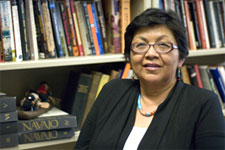Connect With Us...
Rewriting Navajo History

Jennifer Denetdale: PhD
1991 MA in English; 1999 PhD in History
Jennifer Denetdale is passionate about giving a voice to her people. When she began her PhD dissertation at Northern Arizona University, for instance, she set out to write the story of her great-great-great grandparents, who had been Navajo prisoners at Fort Sumner, New Mexico, in the 19th century. Along the way, however, her tale turned into something much larger, as she sought to understand how Navajo history had been constructed by non-Navajos. When she was finished, she had found a calling. And she had made history.
“Northern Arizona University has been able to do something that no other university did,” says Denetdale. “I am the first Navajo to receive a PhD in history.”
Denetdale’s dissertation was ultimately published in 2007 as Reclaiming Diné History: The Legacies of Navajo Chief Manuelito and Juanita. Among other things, her book examined the implications for Navajo people when their histories are told by non-Navajos. Afterward, she found that her message had great resonance among members of the Navajo Nation.
“At my first book signing in Window Rock, the people at the Navajo Nation Museum told me to bring 35 books,” says Denetdale. “I sold out in 30 minutes. There were Navajos that came from more than 100 miles just to buy my book. It was amazing. It was also inspiring to see so many Navajo people interested in history—and in our history.”
Denetdale is also passionate about raising awareness about injustices—both internal and external—that affect the Navajo nation. Her current research, for example, builds on a key theme she touched upon in her first book—gender inequality in the Navajo nation. According to Denetdale, the Navajo Nation government’s strong patriarchal bent presents some key contradictions in a matrilineal society where women are seen as powerful beings. She is also passionate about continuing to illuminate the historical treatment of Native Americans in the United States. How history is told, says Denetdale, is critical to how a nation moves forward.
“I think it is really important to move people through the boundaries of American historiography, which continues to sanitize and deny the historical treatment of Native peoples,” she says. “I still find, for the most part, that non-Indian students do not have knowledge, familiarity, or experience with this important part of the nation’s history. It’s 2010—when does that change?”
Going forward, Denetdale remains committed to helping citizens of the Navajo nation reclaim their collective stories.
“I’m trying really hard to get, in my particular case, Navajo people interested in history,” she says. “I hope we’ll continue this process of decolonization which, for me, means looking at the goal of revaluing our own traditional principles. How do we put those back in place for our nation, our communities, and our families? For me, that’s what my work is about.”